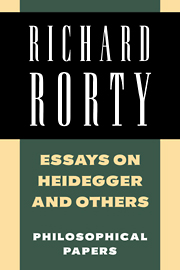Book contents
Deconstruction and circumvention
Published online by Cambridge University Press: 14 January 2010
Summary
The literature–philosophy distinction
Jonathan Culler has recently argued that we should not think of deconstruction as “an attempt to abolish all distinctions, leaving neither literature nor philosophy, but only a general, undifferentiated textuality.” He explains that
a distinction between literature and philosophy is essential to deconstruction's power of intervention: to the demonstration, for example, that the most truly philosophical reading of a philosophical work – a reading that puts in question its concepts and the foundations of its discourse – is one that treats the work as literature, as a fictive rhetorical construct whose elements and order are determined by various textual exigencies. Conversely, the most powerful and apposite readings of literary works may be those that treat them as philosophical gestures by teasing out the implications of their dealings with the philosophical oppositions that support them.
I think this passage shows that we ought to distinguish two senses of “deconstruction.” In one sense the word refers to the philosophical projects of Jacques Derrida. Taken this way, breaking down the distinction between philosophy and literature is essential to deconstruction. Derrida's initiative in philosophy continues along a line laid down by Nietzsche and Heidegger. He rejects, however, Heidegger's distinctions between “thinkers” and “poets” and between the few thinkers and the many scribblers. So Derrida rejects the sort of philosophical professionalism which Nietzsche despised and which Heidegger recovered. This does indeed lead Derrida in the direction of “a general, undifferentiated textuality.” In his work, the philosophy-literature distinction is, at most, part of a ladder which we can let go of once we have climbed up it.
- Type
- Chapter
- Information
- Essays on Heidegger and OthersPhilosophical Papers, pp. 85 - 106Publisher: Cambridge University PressPrint publication year: 1991
- 9
- Cited by



